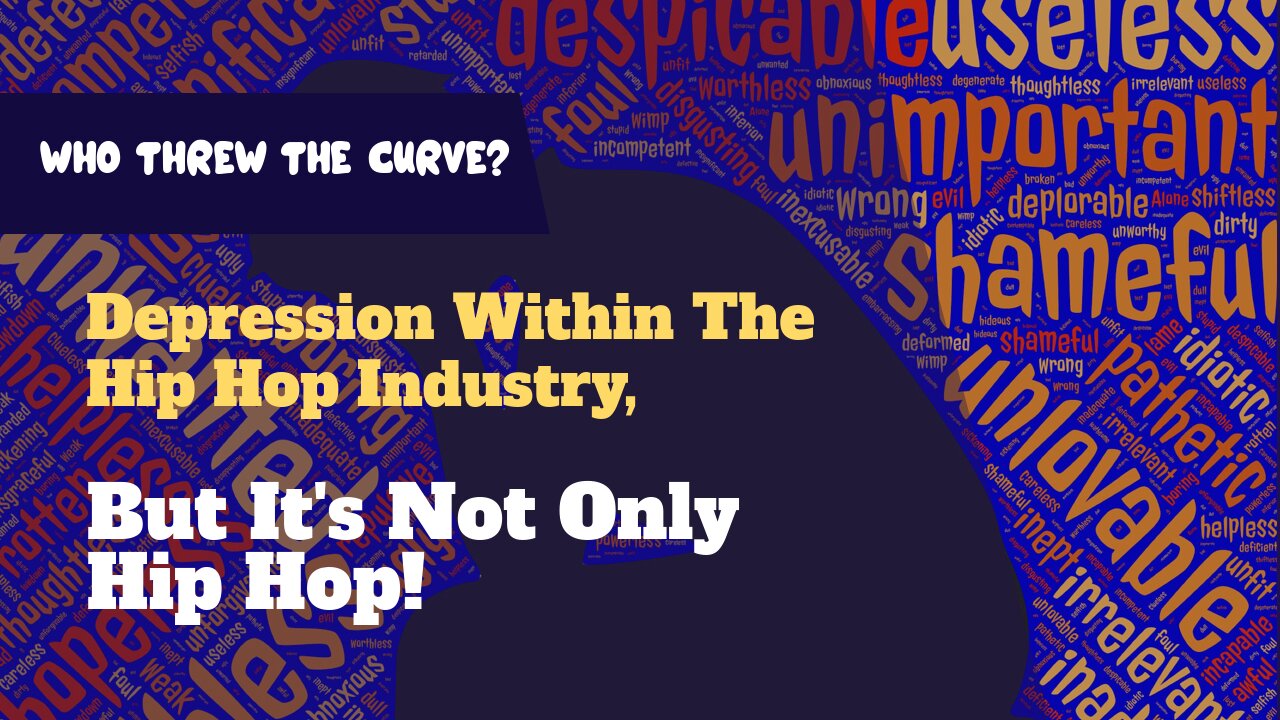Premium Only Content

Depression Within The Hip Hop Industry, But It's Not Only Hip Hop!
Depression Within the Hip Hop Industry: Understanding the Causes and Promoting Mental Well-being
This Article delves into the multifaceted causes of depression within the hip hop industry. By examining the unique challenges faced by artists in this dynamic industry, we aim to shed light on the various factors that contribute to their mental health struggles. Through an analysis of cultural, social, and personal influences, we can gain a comprehensive understanding of the complex dynamics that lead to depression among hip hop artists. By recognizing these underlying causes, we can develop strategies and interventions to support their mental well-being.
The hip hop industry is known for its vibrant creativity and cultural influence. However, behind the glamour and success, many artists battle mental health issues, particularly depression. This essay aims to explore the factors that contribute to depression within the hip hop industry. By understanding the unique challenges faced by hip hop artists, we can gain insights into the causes of their mental health struggles.
II. Cultural Factors
A. Stigma surrounding mental health in hip hop
Hip hop culture has often perpetuated a stigma surrounding mental health. Artists may fear being perceived as weak or vulnerable if they openly discuss their struggles, leading to a reluctance to seek help.
B. Hypermasculinity and its impact on mental well-being
The hip hop industry has traditionally celebrated hypermasculinity, which can hinder emotional expression and suppress vulnerability. The pressure to maintain a tough image and avoid displaying signs of weakness may contribute to the development and exacerbation of depression.
C. Influence of materialism and fame on self-worth
The pursuit of material wealth and fame within the hip hop industry can create a distorted sense of self-worth. Artists may experience constant pressure to prove their success, leading to feelings of inadequacy and a heightened risk of depression.
III. Social Factors
A. Pressure to maintain an image
Artists face immense pressure to project a certain image to appeal to their audience and maintain their fan base. The constant need to meet societal expectations and project success can be emotionally draining and contribute to depressive symptoms.
B. Constant scrutiny from the media and public
Hip hop artists, due to their public prominence, are often subjected to intense media scrutiny and public judgment. Negative press, online harassment, and relentless criticism can take a toll on their mental well-being and contribute to depressive episodes.
C. Limited support systems and isolation
The demanding nature of the industry and the constant travel can lead to a lack of stable support systems for artists. Frequent touring, long hours in the studio, and separation from loved ones can contribute to feelings of isolation, exacerbating depressive symptoms.
IV. Personal Factors
A. Trauma and adverse childhood experiences
Many hip hop artists have experienced traumatic events or adverse childhood experiences, such as poverty, violence, or loss. These experiences can contribute to the development of depression later in life.
B. Substance abuse and its relationship to depression
Substance abuse is prevalent in the hip hop industry and is often used as a coping mechanism for underlying mental health issues. Substance abuse can exacerbate depressive symptoms and create a vicious cycle of self-destructive behavior.
C. Lack of coping mechanisms and emotional regulation skills
The demanding nature of the hip hop industry leaves little time for self-care and the development of healthy coping mechanisms. Artists may lack the necessary emotional regulation skills to navigate the pressures and challenges they face.
V. Isolation and Loneliness
Despite the glamorous lifestyle associated with the hip hop industry, artists often experience profound feelings of isolation and loneliness. Frequent touring, demanding schedules, and long periods away from loved ones can lead to a sense of disconnection and emotional emptiness. Lack of support networks, coupled with the pressure to maintain a strong image, can intensify feelings of loneliness and contribute to depression.
Conclusion
Depression within the hip hop industry is a complex issue influenced by a multitude of factors. The intense pressure, financial instability, public scrutiny, substance abuse, and feelings of isolation contribute to the high prevalence of depression among hip hop artists. Recognizing and addressing these challenges is crucial for promoting mental health within the industry. Increased support systems, access to mental health resources, and open conversations about mental well-being are essential for fostering a healthier environment for hip hop artists. By prioritizing mental health, we can help ensure the overall well-being of individuals within the hip hop industry and promote a culture of resilience and artistic expression.
-
 LIVE
LIVE
itsReel
3 hours agoHAPPY SUNDAY! Picture Perfect, Then Tigger Happy!
84 watching -
 17:28
17:28
Degenerate Jay
3 days ago $0.30 earnedDoes Batman: Arkham Asylum Need A Remake?
7.28K -
 LIVE
LIVE
C03Games
1 hour agoLiving The Mob Life Ain't Easy (Mafia II)
40 watching -
 5:50
5:50
VSOGunChannel
1 day ago $0.45 earnedMcCloskey Finally Gets His Rifle Back
5.79K9 -
 1:01:07
1:01:07
Professor Gerdes Explains 🇺🇦
23 hours agoWhat is Happening With Trump and Putin RIGHT NOW?
4.79K2 -
 1:50
1:50
Memology 101
14 hours ago $0.32 earnedNah, we good...
4.15K24 -
 58:42
58:42
X22 Report
1 day agoMr & Mrs X: America’s Back, Those Who Tried To Destroy American Will Face Justice - Ep 1
315K178 -
 1:13:59
1:13:59
Athlete & Artist Show
5 hours ago $9.08 earnedAJ Galante: From Duffle Bags Of Cash In Danbury, to a Global BKFC Ice Wars Partnership
34.7K5 -
 12:34
12:34
Actual Justice Warrior
2 days agoParoled New York KILLER Strikes Again
61.1K197 -
 13:03
13:03
Dr Disrespect
3 days agoDr Disrespect’s BIGGEST Announcement Yet
88.7K74